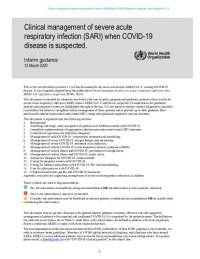
Ebook: Clinical management of severe acute respiratory infection (SARI) when COVID-19 disease is suspected: Interim guidance V1.2 (13 March 2020)
Author: World Health Organization
- Genre: Medicine // Infectious diseases
- Tags: COVID-19, Coronavirus
- Year: 2020
- Publisher: World Health Organization
- Language: English
- pdf
Coronavirus disease 2019 (COVID-19) is a respiratory tract infection caused by a newly emergent coronavirus,
SARS-CoV-2, that was first recognized in Wuhan, China, in December 2019. Genetic sequencing of the virus suggests
that SARS-CoV-2 is a betacoronavirus closely linked to the SARS virus (1).
While most people with COVID-19 develop mild or uncomplicated illness, approximately 14% develop severe disease
requiring hospitalization and oxygen support and 5% require admission to an intensive care unit (1). In severe cases,
COVID-19 can be complicated by acute respiratory disease syndrome (ARDS), sepsis and septic shock, multiorgan
failure, including acute kidney injury and cardiac injury (2). Older age and co-morbid disease have been reported as risk
factors for death, and recent multivariable analysis confirmed older age, higher SOFA score and d-dimer > 1 μg/L on
admission were associated with higher mortality. This study also observed median duration of viral RNA detection was
20.0 days (IQR 17.0–24.0) in survivors, but SARS-CoV-2 virus was detectable until death in non-survivors. The longest
observed duration of viral shedding in survivors was 37 days (3, 4).
Building on evidence-informed guidelines developed by a multidisciplinary panel of health care providers with experience
in the clinical management of patients with COVID-19 and other viral infections, including SARS and MERS, as well as
sepsis and ARDS, this guidance should serve as a foundation for optimized supportive care to ensure both the best possible
chance for survival and allow for reliable comparison of investigational therapeutic interventions as part of randomized
controlled trials (5, 6). This guideline provides recommendations for the management of adults, pregnant and children
with COVID-19.
There is sparse data on clinical presentation of COVID-19 in specific populations, such as children and pregnant women.
In children with COVID-19 the symptoms are usually less severe than adults and present mainly with cough and fever,
and co-infection has been observed (7, 8). Relatively few cases have been reported of infants confirmed with COVID-19
and they experienced mild illness (9). There is currently no known difference between the clinical manifestations of
COVID-19 pregnant and non-pregnant women or adults of reproductive age. Pregnant and recently pregnant women with
suspected or confirmed COVID-19 should be treated with supportive and management therapies, as described below,
taking into account the immunologic and physiologic adaptations during and after pregnancy.
WHO reference number: WHO/2019-nCoV/Clinical/2020.4
SARS-CoV-2, that was first recognized in Wuhan, China, in December 2019. Genetic sequencing of the virus suggests
that SARS-CoV-2 is a betacoronavirus closely linked to the SARS virus (1).
While most people with COVID-19 develop mild or uncomplicated illness, approximately 14% develop severe disease
requiring hospitalization and oxygen support and 5% require admission to an intensive care unit (1). In severe cases,
COVID-19 can be complicated by acute respiratory disease syndrome (ARDS), sepsis and septic shock, multiorgan
failure, including acute kidney injury and cardiac injury (2). Older age and co-morbid disease have been reported as risk
factors for death, and recent multivariable analysis confirmed older age, higher SOFA score and d-dimer > 1 μg/L on
admission were associated with higher mortality. This study also observed median duration of viral RNA detection was
20.0 days (IQR 17.0–24.0) in survivors, but SARS-CoV-2 virus was detectable until death in non-survivors. The longest
observed duration of viral shedding in survivors was 37 days (3, 4).
Building on evidence-informed guidelines developed by a multidisciplinary panel of health care providers with experience
in the clinical management of patients with COVID-19 and other viral infections, including SARS and MERS, as well as
sepsis and ARDS, this guidance should serve as a foundation for optimized supportive care to ensure both the best possible
chance for survival and allow for reliable comparison of investigational therapeutic interventions as part of randomized
controlled trials (5, 6). This guideline provides recommendations for the management of adults, pregnant and children
with COVID-19.
There is sparse data on clinical presentation of COVID-19 in specific populations, such as children and pregnant women.
In children with COVID-19 the symptoms are usually less severe than adults and present mainly with cough and fever,
and co-infection has been observed (7, 8). Relatively few cases have been reported of infants confirmed with COVID-19
and they experienced mild illness (9). There is currently no known difference between the clinical manifestations of
COVID-19 pregnant and non-pregnant women or adults of reproductive age. Pregnant and recently pregnant women with
suspected or confirmed COVID-19 should be treated with supportive and management therapies, as described below,
taking into account the immunologic and physiologic adaptations during and after pregnancy.
WHO reference number: WHO/2019-nCoV/Clinical/2020.4
Download the book Clinical management of severe acute respiratory infection (SARI) when COVID-19 disease is suspected: Interim guidance V1.2 (13 March 2020) for free or read online
Continue reading on any device:

Last viewed books
Related books
{related-news}
Comments (0)